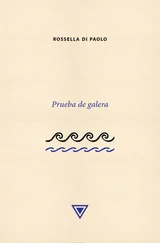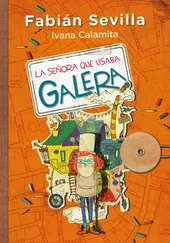Clóvis says he woke up with a dwarf clinging to each leg. He grumbles that today isn’t going to be easy. He coordinates his students’ stretching, and Sara shows off her brand-new Asics running shoes filled with cushioning gel.
How’re your shins, Sara?
Much better!
She squats down and massages the muscles along her bones as he taught her.
They’re better, but they still hurt a bit.
Are you doing your exercises at the gym?
Yep.
Let’s take it slowly. You’re going to use this here today.
He shows her a watch with a heart-rate monitor and explains how she should position the chest strap right under her breasts.
Your mission today is to control your heart rate. Let’s keep it at a hundred and forty, okay? If it drops below that, you pick up the pace. If it passes, it you reduce it.
Can you give me a hand?
She shows him the strap. It appears to be in the right place.
What’s the problem?
Is this the right height?
He pushes it up a quarter of an inch.
There.
The ocean is choppy. Much of the sky is covered in clouds, but orange streaks indicate that the sun has just risen behind the hill. An enormous catamaran is anchored about five hundred yards from the beach with its sails down and its mast conducting the rise and fall of the waves. The group sets out running along the sand, slowly. Sara’s watch beeps. Her heart rate is already one hundred and fifty-five, and they slow their pace. Clóvis takes off ahead of the group. He lets him go. At the end of the beach, they take the road to Siriú, which has a short paved section and then is all dirt road and sand. A kid shoos chickens from the patio of a roadside hut. Every two or three minutes a car or motorbike goes past, and he insists that they all run single file along the edge of the road and keep an eye out on bends. Sara finds her pace, and Denise accompanies her, puffing loudly. Clóvis has left them all behind, and Celma, who has yet to build up her endurance, has started to tire. He tells the girls to go ahead and stays with Celma, alternating between running and walking. Celma says it is a blessing to live here and to be able to go for an early-morning jog in such a beautiful place. She says that God made her go through a lot before she arrived here. He encourages her, and she tells him her whole life story.
When they get back, Sara is sporting the flaming-red cheeks that are her trademark. Her face is covered in sweat and visibly giving off steam. She says that her husband, the dentist, wants to have a barbecue at their place, and the group is invited. Then she takes his arm and pulls him aside as if she wants to tell him a secret.
We still haven’t settled one thing.
What?
How you’re going to charge for the lessons.
I’m still not sure. We’ll talk about it later.
But don’t you have a price?
I’m going to think about it. We’ll talk about it later.
It’s just that it’s been almost a month, and they want to know how much they’re going to have to pay.
Don’t worry about it. We’ll talk about it later.
She looks frustrated but lets it go for the time being.
After the students have gone, he gets the backpack he left hidden behind the wall of a house and puts his running shorts, T-shirt, and shoes in it, leaving on the swimming trunks he is wearing underneath. He gets his goggles and heads out for a swim. The water is cold but bearable. The wind is blowing hard enough to whip up the waves, and he heads through the choppy sea toward the catamaran, planning to swim around it, return to the beach, and repeat the circuit until he is tired. He doesn’t want to swim to Preguiça Beach, as it might anger the fishermen, who are still exercising their right to exclusive access to the bay during the mullet season.
As he approaches the catamaran, he hears warning cries. Puffing and with fogged-up goggles, he raises his head out of the water and sees two crew members in the stern shouting and waving their arms. He takes off his goggles and looks around, trying to see or hear a boat coming in his direction or perhaps a porpoise or goodness knows what. One of the men in the catamaran beckons him over and points at something in the back of the boat. He swims over cautiously, and as he gets a little closer, he is able to see over the top of the waves. An animal is glistening on the stern platform. It is a large, round seal, its fur mottled with patches of light and dark gray. The men are laughing, enchanted by the awkward, whiskered mammal swaying back and forth from flipper to flipper. He stops a few yards from the boat. One of the men says that it was there when they woke up and isn’t showing any sign of wanting to leave. They think it is hungry, and the other man goes into the cabin for a minute and comes back out with a small fish. The seal takes a look at the fish that the man is shaking over its head, gives two short, loud, nasal grunts that sound like pure mockery, and after a dramatic pause, flips effortlessly into the sea and slips beneath the water without a splash. They look at each other, not knowing what to say. He asks who the catamaran belongs to, and the men start to explain that they are just looking after the boat. The owner, a guy from São Paulo who is sailing around the world, stopped there to see to something in Garopaba. The seal leaps out of the water with a somersault worthy of a gymnast and lands in the same position as before on the stern platform. It has a large fish in its mouth, at least three times bigger than the one offered by its hosts. The fish flaps about until the seal tires of showing off and devours it.
• • •
T hat same afternoon he is explaining to the twins how to do a drill to extend their strokes when a woman appears at the entrance to the pool and runs toward him with a worried face and flailing arms.
Your dog’s been run over.
He doesn’t recognize her.
It can’t be mine, he says. My dog’s here.
I saw it! she shouts in exasperation. It was right in front of me, over on the avenue.
He strains to recognize her. She is a slender woman in her early forties, with veins like tree roots running down her arms to her hands.
It isn’t possible. Beta’s lying at the entrance to the gym, he says with impatience that sounds affected to his own ears. She always waits outside reception or with Mila in the snack bar.
He takes two steps toward the door but realizes he doesn’t know where he is going, so he stops and hesitates. The twins take in the scene wide-eyed. They look more identical than ever. He is sweating in the warm air, pungent with the smell of chlorine. The woman grabs his arm.
Come on, let’s go. The man who hit her took her to Greice’s. That’s where you should go.
Do I know you?
Before he has even finished saying it, he knows it was a mistake. He hasn’t rushed in with a question like this in a long time.
What? Are you nuts?
He stares hard at the woman’s face, glances at her sandals, her green and gold sarong with Indian patterns, the blouse without any distinguishing characteristic, earrings, hair, teeth. Nothing.
She places her hand on his face and gives him a maternal look. As if he were a sick child.
Stay calm. I’ll come with you, come on.
He follows her, breathing quickly. His vision has tunneled, and outside of it everything is blurry and no longer of interest.
It’s me, Celma, your student, she says, glancing at him.
I know, sorry. I’m a bit confused.
So this is what Celma’s face looks like. They ran together earlier that morning. She told him much of her life story. He apologizes again. She shakes her head as if to say she doesn’t mind.
As he leaves the pool building, he can’t help but look in the places where Beta normally spends her time. Débora says she hasn’t seen her. Celma loses her patience.
Читать дальше












